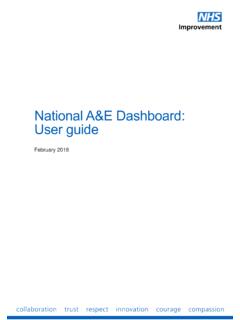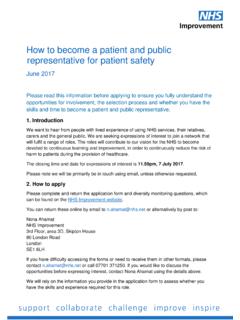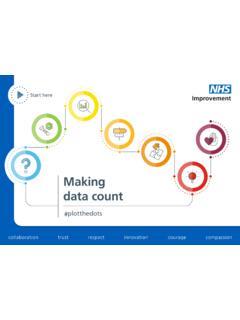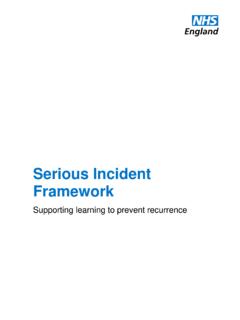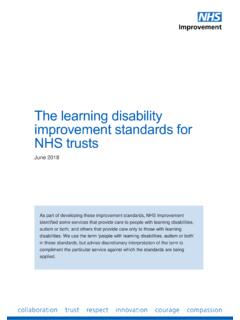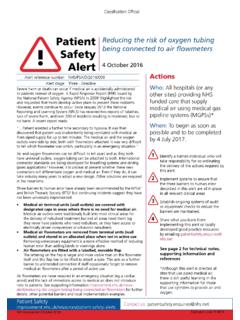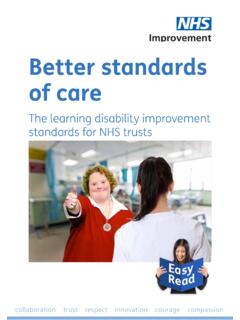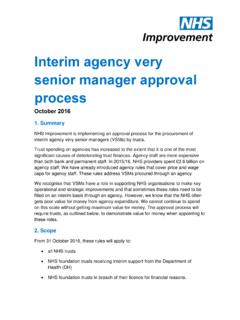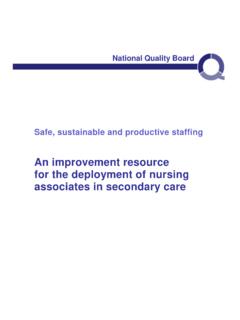Transcription of Developmental reviews of leadership and governance using ...
1 Developmental reviews of leadership and governance using the well-led framework: guidance for NHS trusts and NHS foundation trusts June 2017. Delivering better healthcare by inspiring and supporting everyone we work with, and challenging ourselves and others to help improve outcomes for all. 2 | Developmental reviews of leadership and governance using the well-led framework Contents 1. Introduction 4. 2. About this guidance 5. 3. Managing reviews 8. 4. The well-led framework and descriptions of good practice 10. Annex A: Scoping your Developmental review 42. Annex B: Commissioning an external facilitator 45. Annex C: Carrying out a Developmental review 47. Annex D: Accessing support and further reading 50. 3 | Developmental reviews of leadership and governance using the well-led framework 1. Introduction The boards of NHS foundation trusts and NHS trusts (referred to from here on as providers) are responsible for all aspects of the leadership of their organisations.
2 They have a duty to conduct their affairs effectively and demonstrate measurable outcomes that build patient, public and stakeholder confidence that their organisations are providing high quality, sustainable care. Providers are operating in challenging environments characterised by the increasingly complex needs of an ageing population, growing emphasis on working with local system partners to create innovative solutions to long- standing sustainability problems, workforce shortages and the slowing growth in the NHS budget. As set out in Developing people improving care, these challenges require changes in how leaders equip and encourage people at all levels in the NHS to deliver continuous improvement in local health and care systems and gain pride and joy from their work. Robust governance processes should give the leaders of organisations, those who work in them, and those who regulate them, confidence about their capability to maintain and continuously improve services.
3 In-depth, regular and externally facilitated Developmental reviews of leadership and governance are good practice across all industries. Rather than assessing current performance, these reviews should identify the areas of leadership and governance of organisations that would benefit from further targeted development work to secure and sustain future performance. The external input is vital to safeguard against the optimism bias and group think to which even the best organisations may be susceptible. We therefore strongly encourage all providers to carry out externally facilitated, Developmental reviews of their leadership and governance using the well-led framework every three to five years, according to their circumstances. 4 | Developmental reviews of leadership and governance using the well-led framework 2. About this guidance This guidance on our updated well-led framework for leadership and governance Developmental reviews sets out the process and content of these Developmental reviews .
4 It supports providers to maintain and develop the effectiveness of their leadership and governance arrangements. It replaces Well-led framework for governance reviews : guidance for NHS foundation trusts (April 2015), and applies to both NHS trusts and foundation trusts The guidance retains a strong focus on integrated quality, operational and financial governance and includes a new framework of key lines of enquiry (KLOEs) and the characteristics of good organisations. It provides strengthened content on leadership , culture, system-working and quality improvement. In a change from previous frameworks, and in support of our commitment to working more closely with our regulatory partners, the structure of our framework (KLOEs and the characteristics) is wholly shared with the Care Quality Commission (CQC), and underpins CQC's regular regulatory assessments of the well-led question. This means that information prepared for regulation can also be used for development, and vice versa.
5 The main elements of this framework are also reflected in NHS England's improvement and assessment framework for clinical commissioning groups (CCGs). However, while CQC's regulatory assessments are primarily for assurance, Developmental reviews are primarily for providers themselves to facilitate continuous improvement. Drawing on the latest research and evidence, we also describe updated good practice to help providers identify their own areas for development and key barriers to overcome. This good practice is not a checklist: a mechanical ticking off' of each item is unlikely to lead to better performance. The attitude of organisational leaders to the review process, the connections they draw between the framework's different areas, and their judgements about what needs to be done to continually improve, are much more important. 5 | Developmental reviews of leadership and governance using the well-led framework We therefore strongly encourage providers to engage with the review processes openly and honestly, selecting an external facilitator to provide tailored support and prioritise actions arising from reviews .
6 We also encourage providers to make more use of peer review, to utilise and enhance skills within the NHS, draw on learning from others and share learning back with the system. This is how providers individually and together will gain the greatest benefit from these reviews . A note on system working We know the increasing focus on working with partners across health and social care, for example in sustainability and transformation partnerships (STPs), creates a tension for providers as they continue to work on organisational performance as part of wider system performance. We maintain our focus on organisations because this is the statutory basis for service provision, but we have increased the emphasis in this guidance on working proactively with partners. Many of the principles of good governance at organisational level are applicable at system level and we encourage local system partners to use this framework for development if it is appropriate.
7 6 | Developmental reviews of leadership and governance using the well-led framework How to use this guidance: comply or explain This guidance is issued on a comply or explain' basis. This means we strongly encourage providers to carry out Developmental reviews or equivalent activities approximately every three years to ensure they identify potential risks before these turn into issues. Better performing providers are probably already doing this, and, for example, using internal audit functions to work on particular areas of concern. In keeping with the Single Oversight Framework we use to identify the level of support providers need, we are providing extra flexibility based on individual circumstances. This means we can agree longer timeframes for review (up to a maximum of five years) where risks seem lower and shorten the timeframe where risks seem higher, or where particular circumstances suggest a review may be necessary (eg significant turnover of board members, organisational transactions, or significant deterioration in some aspect of performance).
8 On that basis: Comply means we strongly encourage all providers to carry out Developmental reviews every three years or within the agreed timeframe agreed with NHS Improvement using this guidance. Explain means a provider needs to give a considered explanation if it uses alternative means to assure itself regarding its leadership and governance or chooses to omit material components of the framework (eg one or more of the eight KLOEs). Departing from the guidance may be justified where a provider can demonstrate it is meeting the actions expected under the guidance in a similar manner, for example partial reviews over consecutive years. We will always consider the circumstances of an individual case. 7 | Developmental reviews of leadership and governance using the well-led framework 3. Managing reviews This section describes the common steps of a Developmental review. Providers are free to tailor their approach to suit their organisational circumstances, provided they incorporate the principal areas of enquiry set out in the framework.
9 Annexes A to D provide further detail as noted below. Stage Notes Initial The board should reflect on its performance with an initial investigation to investigation that involves self-review against the determine framework. This should identify any areas in the scope of review framework or extra areas outside the framework (eg arising from internal and external audit review findings, (see Annex A). annual or corporate governance statements) that require particular focus as part of the review. Clarifying the scope of the review will enable the board to engage external facilitators with appropriate skills. The board should be as honest as possible in this assessment as the congruence between the provider's self-review and the external facilitator's perception can indicate the provider's level of insight. Commissioning External facilitation is a key part of Developmental an external reviews : it provides objectivity and challenge that may not reviewer available within the provider.
10 (see Annex B) Choosing an external facilitator is the provider's responsibility. As well as the skills and experience needed to address specific areas of focus arising from self-review, the provider must ensure their supplier can take a holistic view of the organisation, connecting findings from different parts of the review and supporting action-planning, including suggesting appropriate interventions. Providers should also ensure reviewers are suitably independent of the board. This includes avoiding using reviewers who have done audit or governance -related work for the provider in the previous three years, unless there are suitable safeguards against conflict of interest 8 | Developmental reviews of leadership and governance using the well-led framework (ie information barriers). We also encourage providers to consider involving peer reviewers as part of their external facilitation team, where appropriate, to make use of and enhance leadership and governance capability in the NHS.
